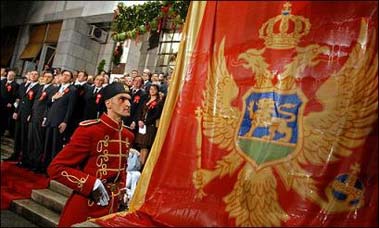|

A Montenegrin wearing the traditional soldier's
uniform looks up as the flag of Montenegro is raised in front of the
parliament building in Podgorica. Montenegro's parliament proclaimed independence for the tiny Balkan
republic Saturday, forming a new European state and formally dissolving
the last union of the former Yugoslavia.
[AFP]
|
Montenegro's parliament proclaimed independence for the tiny Balkan republic
Saturday, forming a new European state and formally dissolving the last union of
the former Yugoslavia.
Fireworks went off in a rainy sky over Montenegro's capital, and a
red-and-gold Montenegrin flag was raised over the parliament building, where the
assembly had unanimously verified the May 21 referendum in which a slight
majority of Montenegrins voted for the split from Serbia.
The ancient Montenegrin anthem "Oh, The Bright May Dawn" was played inside
the assembly chamber, from which the declaration was broadcast countrywide.
The independence declaration envisages Montenegro as a "multiethnic,
multicultural and multireligious society ... based on the rule of law and market
economy."
A few hundred Montenegrins took to the streets despite pouring rain to
celebrate their new freedom, apart from Serbia for the first time since 1918.
"This is the moment when new horizons open for my country," said painter
Goran Novakovic, 32. "This is the most important day in than the entire century
for this country."
"I am extremely happy," student Danilo Radovic said. "The dream of
generations of Montenegrins has been fulfilled."
After reading the declaration, which declared the tiny country's national
goal as integration into the European Union and NATO, Speaker Ranko Krivokapic
said "Long live Montenegro!"
"The citizens of Montenegro, once and for all, have brought back their
country into the family of free nations and states," Krivokapic said.
The declaration also said Montenegro would immediately start procedures for
admission to the United Nations and other international organizations.
It was careful, however, to acknowledge its former partner Serbia by stating
Montenegro's "special interest and full readiness" to "build good and friendly
relations with Serbia."
Not everyone was pleased with the new status, which was determined by the
slimmest margin in the referendum - just half a percentage point, or 2,090
votes, over the 55-percent threshold for validating secession under European
Union guidelines.
Serbia and Montenegro are linked culturally as well as historically, sharing
the same Christian orthodox religion and language.
"I will not die because my option has lost," said Darinka Joksimovic, 34, a
translator. "But, now that it has happened, I can only hope that things will get
better and that we will build a better future."
No Serbian officials attended the independence ceremonies, after Serbian
conservative Prime Minister Vojislav Kostunica had refused to officially
congratulate Montenegro's pro-independence leaders on the referendum results.
Serbian President Boris Tadic, however, issued a statement Saturday wishing
the people of Montenegro "peace, stability and overall prosperity" on their way
to European integration.
"On that road, as always in our history, Serbia will be the closest friend,"
said Tadic. "I am in favor of preserving family, historic, cultural, economic
and political ties, because they present an unbreakable bond between our two
countries."
The Serbia-Montenegro union had been the last shred of what was once
Yugoslavia, following years of crisis in the Balkans that began when the
federation of six republics disintegrated in violence in the 1990s.
No formal borders are expected to be formed soon between Serbia and
Montenegro, which already have separate economies and political systems.
Serbia's defense minister said Saturday that the only joint body - the
military - would accept Montenegro's independence, and all Serbian soldiers
would withdraw from Montenegro next week.
With tiny Montenegro's independence, Serbia also becomes de-facto
independent, and Serbian parliament planned to finalize the new status next
week.
Montenegro's unionist parties, who were opposed to the split with Serbia,
boycotted the parliament session.
Serbia - eight times larger than Montenegro - had opposed previous
declarations of independence by Slovenia, Croatia and Bosnia, triggering nearly
a decade of wars.
Montenegro had been an independent kingdom in the late 19th and early 20th
centuries, but it abandoned its statehood to join a new Serb-led Balkan union in
1918.